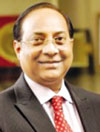Bangladesh Bank has set the SME loan disbursement target at over Tk1,00,000 crore through all the commercial banks in the current year 2015.
The target is 16.35% higher than the earlier target of Tk89,000 crore for the year 2014.
“We have increased the loan disbursement target for the SME sector as the banks focused their lending to this sector amid lack of demand for by industrial sector,” said Swapan Kumar Roy, general manager of SME and Special Programmes Department of Bangladesh Bank.
He observed that banks came out from the traditional banking to shift the focus on the retail banking through promoting SMEs.
Banks should take initiatives for arranging training programmes to make the SMEs sector efficient, he opined.
Though the overall credit growth remained in a slower pace, SME loan disbursement, however, witnessed an increased trend as banks were vigorously implementing their SME lending strategy amid political uncertainty, he explained.
“We expected that the SME loan disbursement will be higher than that of the target set for the year 2015,” he said.
According to the target, SME loans worth Tk7,058 crore have been set for the state-owned banks, Tk5,600 crore for specialised banks, Tk86,503 crore for private commercial banks while Tk803 crore for foreign banks.
Non-bank financial institutions will have to disburse SME loans of Tk3,625 crore.
The lowest target of SME loans has been set for foreign banks, as they have not enough branches in rural areas, said Swapan Kumar.
He also explained that micro finance institutions and NGOs were authorised to disburse only agriculture loans in the rural areas through setting linkage program, which was not incorporated into the SME policy. As a result, foreign banks could not disburse SME loans in the rural area.
Loan disbursement to Small and Medium Enterprises rose over 15% in the first nine months of the last year.
Banks and non-bank financial institutions disbursed a loan of Tk72,062 crore between January and September last year, which was 81% of a total annual target of Tk89,030 crore, according to the central bank data.
The loan of Tk62,472 crore was disbursed in the same period of the previous year against the target of Tk74,186 crore.
According to the central bank data, a major share of the total disbursed SME loan goes to business. During the first nine months of 2014, 64% of total SME loan went to the business sector, 28% to the industrial sector while 8% to the service sector.
Loan disbursement to women entrepreneurs increased by 13% to Tk2,651 crore between July and September quarter of the year 2014 compared to the same period of the previous year.
Of the total disbursed SME loan in that quarter, Tk6203 crore went to the rural area and Tk18,750 crore to the urban area.
News;Dhaka Tribune/29-Jan-2025




